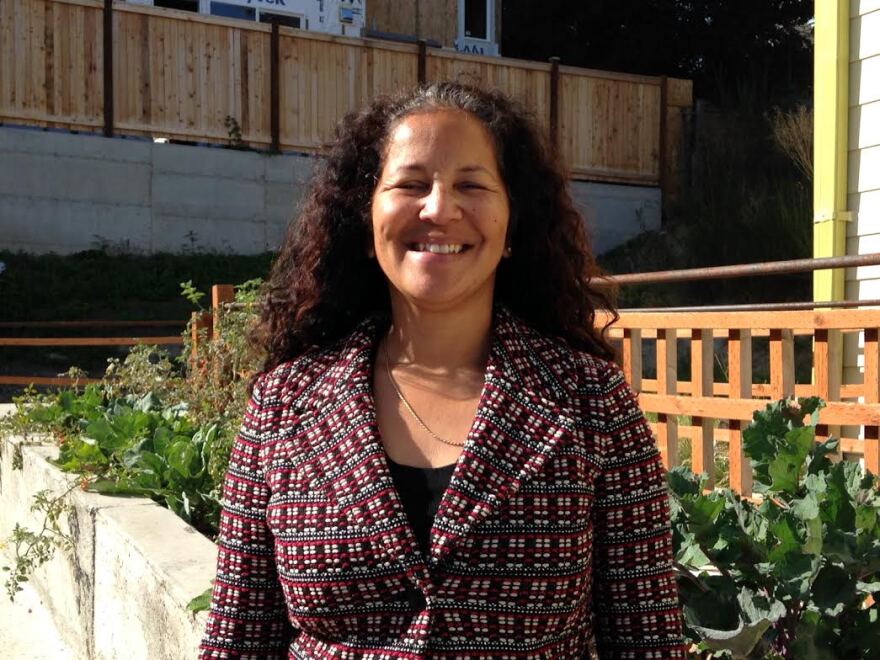It is hard to miss the gentrification taking place in Seattle’s Central District. Walk around the neighborhood and you see modest houses being torn down to make way for pricey condos and upscale businesses going in.
Some residents say the cost of gentrification is the loss of a strong African-American community. We spoke with the two District 3 City Council candidates vying to represent the area, City Councilwoman Kshama Sawant and Urban League of Seattle President Pamela Banks, about the rapid change going on in the Central District.
‘The Black Community Has Been Pushed Out’
When we spoke with residents of the Central District for a primary election story, I heard over and over about the effect gentrification was having on the African American community.
Until the 1970s, redlining and other racist practices prevented blacks from living elsewhere in the city. As a result, the Central District, or Central Area as it’s also known, became the cultural hub of African-American life. In the 1970s, the area was more than 70 percent black; now it is less than 20 percent.
“You know, the black community is gone,” said K.L. Shannon, who has lived in the neighborhood all her life. “The black community has been pushed out of the Central Area.”
Both Candidates Worry About Gentrification

Both Seattle City Council District 3 candidates Kshama Sawant and Pamela Banks say they are concerned about what’s happening.
“Gentrification is absolutely a problem all throughout Seattle,” said Sawant.
Sitting in the shadow of a new condo building going up on a residential block, Banks says she has seen the same thing happen in other cities, such as Portland, where she used to live.
“When it happens or while it’s happening, nobody’s saying anything and then, after it’s done, then people are like, ‘Oh my gosh the neighborhood gentrified,’” Banks said.
Doggie Daycare Signals Changes In The Central District

For Pamela Banks, gentrification is personal as well. She says she’s watched over the past several years as black owned businesses closed and white owned shops opened up.
“When The Facts Newspaper turned into a doggie daycare, or the Thompson's Point of View restaurant turned into a vegan restaurant, that’s the first signs,” said Banks. “And then housing prices go up and then major investment starts coming in and that’s what’s happened in the Central District.”
Affordable Housing Is The Key
Banks and her opponent Kshama Sawant both say the question is how to retain racial and economic diversity in a neighborhood facing such major development. Both say, not surprisingly, it is about keeping housing affordable. But they differ on how best to do that.
Sawant wants rent control and has made it a cornerstone of her campaign. Our interview with her actually took place at a rent control rally.
“We can see if we don’t pass laws that give renters power in the housing market, it is effectively redlining,” she said. “Look at the Central District; it used to be 80 percent African-American and now less than 20 percent are African-American.”
Banks Favors Rent Subsidies Over Rent Control
Pamela Banks opposes rent control because, she says, it has not worked in other places it has been tried.
“I do not want us to look like San Francisco. They still have the highest rents in country and it’s really become a city of the haves and have-nots - the rich and poor.” Banks said.
Banks isn’t opposed to government intervention in the housing market, but favors rental subsidies over rent control. She’d also like to see down payment assistance for new homebuyers. She says she was able to buy her home a few decades ago through such a program.
Sawant Says Housing Crisis Demands Extreme Measures
Sawant counters that the subsidies favored by Banks do not go far enough. Desperate times, she says, call for more aggressive measures like rent control.
“Probably, at this point, a majority of the population in Seattle is paying more than 30 percent of their income in rent, and that's a crisis,” she said.
Sawant also wants the city to use its bonding capacity to build thousands of city-owned units each year that would be rented at below-market rates. And, she says, the city should get involved in mortgage relief for owners who are financially underwater.
Banks Wants To Stop 'Predatory Real Estate Agents’
Banks says one way to help keep the Central District diverse is to stop “predatory real estate agents and developers."
“We need to prevent them from knocking on people’s doors; especially African American seniors who’ve lived in their homes 30, 40, 50 years; and offering them cash for their house,” she said. “Something needs to be done with that. I mean, I get a postcard a week and I live in a townhome.”
Socialist Vs. Local Roots
Kshama Sawant and Pamela Banks differ in style as well as in the substance of their proposals. Sawant is the first socialist elected to the Seattle City Council and is often on the national stage.
Pamela Banks likes to say she is not about an ideology or revolution. She emphasizes her local roots, pointing out that long before Black Lives Matter became a hashtag, she was raising a black son in the Central District.


